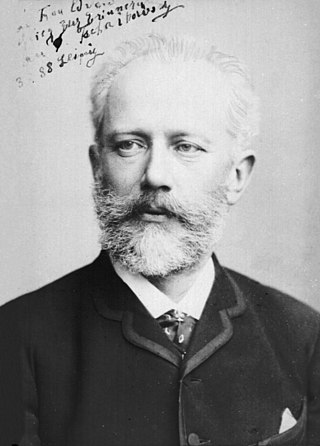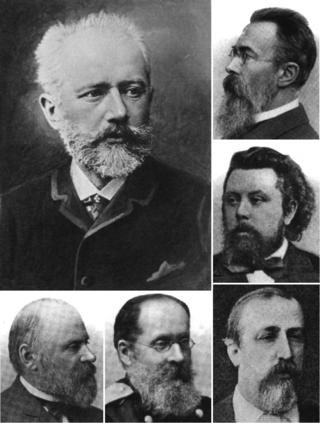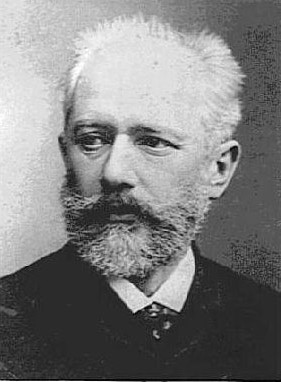Related Research Articles

Pyotr Ilyich Tchaikovsky was a Russian composer of the Romantic period. He was the first Russian composer whose music would make a lasting impression internationally. Tchaikovsky wrote some of the most popular concert and theatrical music in the current classical repertoire, including the ballets Swan Lake and The Nutcracker, the 1812 Overture, his First Piano Concerto, Violin Concerto, the Romeo and Juliet Overture-Fantasy, several symphonies, and the opera Eugene Onegin.

"God Save the Tsar!" was the national anthem of the Russian Empire. The song was chosen from a competition held in 1833 and was first performed on 18 December 1833. It was composed by violinist Alexei Lvov, with lyrics written by the court poet Vasily Zhukovsky. It was the anthem until the February Revolution of 1917, after which "Worker's Marseillaise" was adopted as the new national anthem until the overthrow of the Russian Provisional Government by the Bolsheviks in the October Revolution of the same year.

Swan Lake, Op. 20, is a ballet composed by Russian composer Pyotr Ilyich Tchaikovsky in 1875–76. Despite its initial failure, it is now one of the most popular ballets of all time.

The Year 1812, Solemn Overture, Op. 49, popularly known as the 1812 Overture, is a concert overture in E♭ major written in 1880 by Russian composer Pyotr Ilyich Tchaikovsky. The piece commemorates Russia's successful defense of the French invasion of the country by Napoleon in 1812.

The Nutcracker, Op. 71, is an 1892 two-act classical ballet by Pyotr Ilyich Tchaikovsky, set on Christmas Eve at the foot of a Christmas tree in a child's imagination. The plot is an adaptation of E. T. A. Hoffmann's 1816 short story The Nutcracker and the Mouse King. The ballet's first choreographer was Marius Petipa, with whom Tchaikovsky had worked three years earlier on The Sleeping Beauty, assisted by Lev Ivanov. Although the complete and staged The Nutcracker ballet was not as successful as had been the 20-minute Nutcracker Suite that Tchaikovsky had premiered nine months earlier, The Nutcracker soon became popular.

Kamarinskaya is a traditional Russian folk dance, which is mostly known today as the Russian composer Mikhail Glinka's composition of the same name. Glinka's Kamarinskaya, written in 1848, was the first orchestral work based entirely on Russian folk song and to use the compositional principles of that genre to dictate the form of the music. It premiered on 15 March 1850. It became a touchstone for the following generation of Russian composers ranging from the Western-oriented Pyotr Ilyich Tchaikovsky to the group of nationalists known collectively as The Five and was also lauded abroad, most notably by French composer Hector Berlioz.
Romeo and Juliet, TH 42, ČW 39, is an orchestral work composed by Pyotr Ilyich Tchaikovsky. It is styled an Overture-Fantasy, and is based on Shakespeare's play of the same name. Like other composers such as Berlioz and Prokofiev, Tchaikovsky was deeply inspired by Shakespeare and wrote works based on The Tempest and Hamlet as well.

The Piano Concerto No. 1 in B♭ minor, Op. 23, was composed by Pyotr Ilyich Tchaikovsky between November 1874 and February 1875. It was revised in 1879 and in 1888. It was first performed on October 25, 1875, in Boston by Hans von Bülow after Tchaikovsky's desired pianist, Nikolai Rubinstein, criticised the piece. Rubinstein later withdrew his criticism and became a fervent champion of the work. It is one of the most popular of Tchaikovsky's compositions and among the best known of all piano concerti.

The Marche slave in B-flat minor, Op. 31, is an orchestral tone poem by Pyotr Ilyich Tchaikovsky published in 1876. It was written to celebrate Russia's intervention in the Serbo-Ottoman War.

Pyotr Ilyich Tchaikovsky wrote his Symphony No. 1 in G minor, Winter Daydreams , Op. 13, in 1866, just after he accepted a professorship at the Moscow Conservatory: it is the composer's earliest notable work. The composer's brother Modest claimed this work cost Tchaikovsky more labor and suffering than any of his other works. Even so, he remained fond of it, writing to his patroness Nadezhda von Meck in 1883 that "although it is in many ways very immature, yet fundamentally it has more substance and is better than any of my other more mature works." He dedicated the symphony to Nikolai Rubinstein.
The Symphony No. 2 in C minor, Op. 17 by Pyotr Ilyich Tchaikovsky was composed in 1872. One of Tchaikovsky's joyful compositions, it was successful right from its premiere and also won the favor of the group of nationalistic Russian composers known as "The Five", led by Mily Balakirev. Because Tchaikovsky used three Ukrainian folk songs to great effect in this symphony, it was nicknamed the "Little Russian" by Nikolay Kashkin, a friend of the composer as well as a well-known musical critic in Moscow. Ukraine was at that time frequently called "Little Russia".

In mid- to late-19th-century Russia, Pyotr Ilyich Tchaikovsky and a group of composers known as The Five had differing opinions as to whether Russian classical music should be composed following Western or native practices. Tchaikovsky wanted to write professional compositions of such quality that they would stand up to Western scrutiny and thus transcend national barriers, yet remain distinctively Russian in melody, rhythm and other compositional characteristics. The Five, made up of composers Mily Balakirev, Alexander Borodin, César Cui, Modest Mussorgsky, and Nikolai Rimsky-Korsakov, sought to produce a specifically Russian kind of art music, rather than one that imitated older European music or relied on European-style conservatory training. While Tchaikovsky himself used folk songs in some of his works, for the most part he tried to follow Western practices of composition, especially in terms of tonality and tonal progression. Also, unlike Tchaikovsky, none of The Five were academically trained in composition; in fact, their leader, Balakirev, considered academicism a threat to musical imagination. Along with critic Vladimir Stasov, who supported The Five, Balakirev attacked relentlessly both the Saint Petersburg Conservatory, from which Tchaikovsky had graduated, and its founder Anton Rubinstein, orally and in print.

Ludwig Minkus, also known as Léon Fyodorovich Minkus, was an Austrian composer of ballet music, a violinist and teacher of music.
Pyotr Ilyich Tchaikovsky composed his Orchestral Suite No. 2 in C major, Op. 53, in 1883. It was premiered on February 16, 1884 at a Russian Musical Society concert in Moscow, conducted by Max Erdmannsdörfer. The piece was well enough received to be repeated a week later. It is dedicated to his brother Anatoly's wife, Praskovya Vladimirovna Tchaikovskaya.
Kong Christian stod ved højen mast, commonly shortened to Kong Christian, is the unofficial royal anthem of the Kingdom of Denmark that officially has equal status of national anthem together with Der er et yndigt land, though it is almost exclusively used in relation to the Danish royal house and the military. The theme of the song is the heroics of Danish and Norwegian sailors during the wars against Sweden in the 17th and 18th centuries.

Pyotr Ilyich Tchaikovsky struggled with sonata form, the primary Western principle for building large-scale musical structures since the middle of the 18th century. Traditional Russian treatment of melody, harmony and structure actually worked against sonata form's modus operandi of movement, growth and development. Russian music—the Russian creative mentality as a whole, in fact—functioned on the principle of stasis. Russian novels, plays and operas were written as collections of self-contained tableaux, with the plots proceeding from one set-piece to the next. Russian folk music operated along the same lines, with songs comprised as a series of self-contained melodic units repeated continually. Compared to this mindset, the precepts of sonata form probably seemed as alien as if they had arrived from the moon.

While the contributions of the Russian nationalistic group The Five were important in their own right in developing an independent Russian voice and consciousness in classical music, the compositions of Pyotr Ilyich Tchaikovsky became dominant in 19th century Russia, with Tchaikovsky becoming known both in and outside Russia as its greatest musical talent. His formal conservatory training allowed him to write works with Western-oriented attitudes and techniques, showcasing a wide range and breadth of technique from a poised "Classical" form simulating 18th century Rococo elegance to a style more characteristic of Russian nationalists or a musical idiom expressly to channel his own overwrought emotions.
The Sérénade mélancolique in B-flat minor for violin and orchestra, Op. 26, was written by Pyotr Ilyich Tchaikovsky in February 1875. It was his first work for violin and orchestra, and was written immediately after completing the Piano Concerto No. 1 in B-flat minor.
The Festival Coronation March in D major, TH 50, ČW 47, is an orchestral work by Peter Ilyich Tchaikovsky ordered by the city of Moscow for the coronation of Tsar Alexander III in 1883. It was written during March 1883 and performed for the first time on June 4[O.S. May 23], 1883 in Sokolniki Park (Moscow), conducted by Sergei Taneyev. The music included excerpts of the anthem God Save the Tsar. Recordings of this piece generally run between 5 and 5½ minutes.
Denmark is one of only two countries in the world—the other being New Zealand—with two official national anthems of equal status. Officially, Kong Christian stod ved højen mast is both a national and a royal anthem; it has equal status with Der er et yndigt land, which is treated as the civil national anthem. At sports events and other civil events, Der er et yndigt land is the one played.
References
Cited from David Brown's "Tchaikovsky: The Man and His Music"